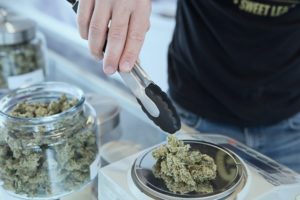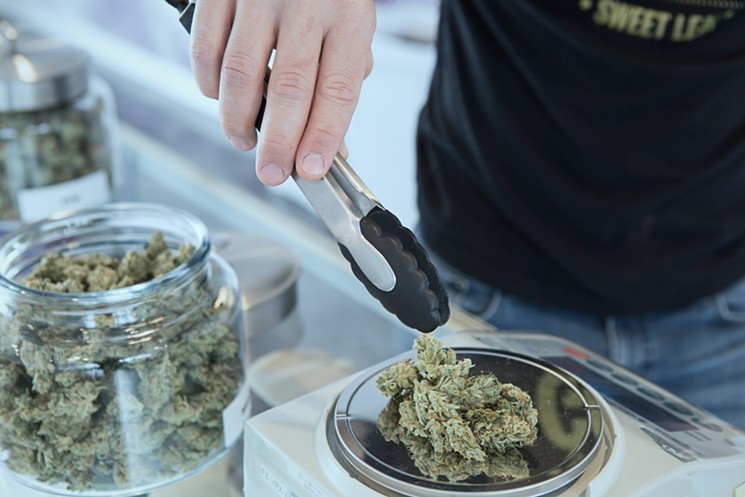 Often times when loosening weed regulations is discussed at the local level, some are quick to say it’s an issue that should be taken up by the state, not lowly city officials. Now a bill filed by Dallas-based state Rep. Jessica González would give counties and municipalities the choice to legalize recreational weed by order or ordinance.
Often times when loosening weed regulations is discussed at the local level, some are quick to say it’s an issue that should be taken up by the state, not lowly city officials. Now a bill filed by Dallas-based state Rep. Jessica González would give counties and municipalities the choice to legalize recreational weed by order or ordinance.
House Bill 3248 would also impose a 10% tax on weed products. A 10th of that tax revenue would go toward regulation, another 10% would pay for cannabis testing and quality control, 20% would go to participating local governments for oversight, and the rest would go to the Foundation School Fund.
“While Texas has made progress with the Compassionate Use Act, we have been left behind on a potential revenue source that would increase investments in public education, stop the unnecessary arrests for cannabis possession and create jobs in our state,” González said in a press release. “We should allow our local communities to make the best decision for themselves in regards to cannabis legalization, and HB 3248 would allow that for adults 21 years or older.”
González did not respond for comment, but the bill’s full text can be seen here.
Notably, under the bill, a person would not be able to prohibit a residential tenant under a lease agreement from possessing cannabis, cannabis products or paraphernalia or from consuming it “by means other than smoking on the premises.” It also lays out the infrastructure of how to legally sell cannabis.
Daryoush Austin Zamhariri, creator and chief editor of the Fort Worth-based Texas Cannabis Collective news site, told the Observer the bill looks promising. “If it could get a hearing, I think it would get a lot of support from the community,” Zamhariri said.
Weed reform advocates often task themselves with trying to loosen restrictions at both the state and local level.
“[Counties and municipalities are] not allowed to change the drug laws themselves,” Zamhariri said. “They are allowed to kind of modify how they use the enforcement and how they allocate funds toward that.”
Dallasites have seen this first hand. Council member Adam Bazaldua proposed a resolution that would keep Dallas cops from charging people for low-level weed possession. It was later decided to let police Chief Eddie Garcia craft a change to the department’s general orders to reduce weed law enforcement. Under the proposed change, cops wouldn’t charge people for possession of 2 ounces of we cannabis ed unless there is evidence of intent to distribute.
“I would be thrilled to vote in favor of the legalization at the local level.” – Adam Bazaldua, Dallas City Council
Additionally, in 2017, the Dallas City Council adopted a cite-and-release program that allowed officers at their own discretion to issue misdemeanor tickets to anyone caught with 4 ounces or less of cannabis.
However, changing drug laws at the state level in Texas is especially hard. Despite polls
It may be even harder this year. A big obstacle this go-around will be the focus on COVID-19 and the power grid. The attention to these issues may divide focus and support for significant weed reform.
“This far late in the game, it seems as if the timing is such that it’s probably not going to happen this cycle,” Zamhariri said. “But, things can change. Things can happen very quickly, so we’ll see.”
Given the budget deficit, though, Zamhariri said making weed legal would make sense considering all the revenue it would generate. But then again, this is Texas we’re talking about.
Jesuorobo Enobakhare Jr., chair of the community police oversight board, told the Observer, “I think this is a great step.”
Jesuorobo appreciates the chief’s efforts with the change in general orders. However, he would rather see the issue taken up by a resolution like Bazaldua’s or, if the bill passes, by order or ordinance. His worry is that a new chief could come along and change the general orders again to be tough on weed.
The Dallas Police Department is moving forward with a change to its general orders that would reduce enforcement of low-level possession charges.
If passed, Jesuorobo said, the bill could give Dallas citizens more of a say and would force council members to take a stand on the issue instead of leaving it to the state to decide.
“I really believe this is a state issue,” council member Cara Mendelsohn said during an update on Bazaldua’s resolution at the January public safety committee meeting.
Asked if they would support an order or ordinance that would legalize recreational weed use in Dallas, Jennifer Gates, chair of the public safety committee, said she didn’t have time to read the bill and had no further comment. Mendelsohn said if the bill passes to come back and ask her. Bazaldua said he would vote in favor. All of the public safety committee members eventually supported the police chief’s proposed change to the general orders.
“I would be thrilled to vote in favor of the legalization at the local level,” Bazaldua said. “Marijuana has been criminalized for too long, which has resulted in a perpetuation of the school-to-prison pipeline and over-incarceration rates that have much greater impacts on brown and Black communities,” he said.
Most drug-related arrests, 85%, are for possession of less than 2 ounces of weed, according to a report presented to the Community Police Oversight Board. The report said the city wastes money and resources on these arrests. Black people make up nearly a quarter of the city’s population but account for 49% of all arrests and 57% of pot possession arrests.
The elimination of the weed black market would have a direct impact on drug-related crimes in Dallas, Bazaldua said.
“[It] would also provide an ability to regulate the sale of the substance, many new job opportunities and a substantial new tax revenue source that could potentially be used to better invest in our under-invested communities’ basic infrastructure and quality of life,” Bazaldua added.
If he had to bet on it, Zamhariri said he doesn’t think this bill will pass, as Texas is usually at least a decade behind the times when it comes to cannabis.
Until DPD implements the new general orders, Dallas cops will likely still charge you if you’re caught with weed. The district attorney’s policy, though, is to throw out the case if you have a clean record and no other charges.

